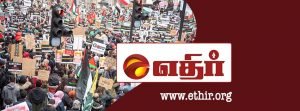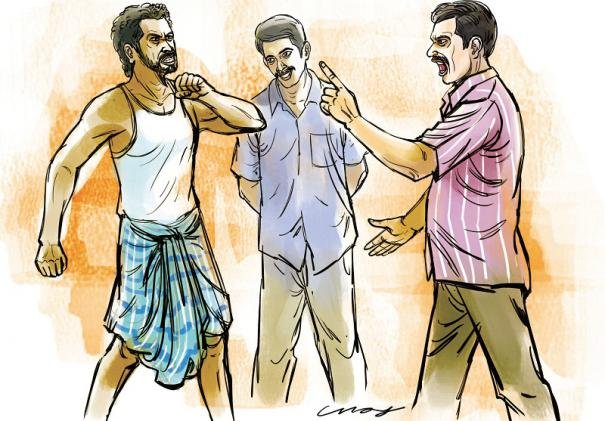Strike While The Regime Is Weak
esident were to be decided purely on the basis of electoral arithmetic, then Mahinda is a goner – as the excellent article by Kusal Perera (How will the SL electorate behave?) outlined. But events cannot always be relied upon to follow an expected route. Among many other factors, the organisational strength of the masses can be a vital factor in determining an outcome that will be in service to the masses. Unfortunately in Sri Lanka no mass organisation has participated in the process. It is for this reason that we argued against all the would-be illusionists who wanted to paint a picture of a common opposition crushing the monster with one blow to the executive presidency.
Now that the shine is coming off the so-called opposition, we must credit the father of the common candidate proposal himself, Kumar David, who was first in line to call Maithri a ‘renegade’ and all that. Can he and others make use of this belated wisdom to argue the case for something new – a proposal for the building of a new mass alternative? Maithri never even pretended to be in the camp of those who want real change. So it’s pointless to call him names now. He lives up to what he is – a loyal servant of Sinhala nationalism and a brutal face for capitalism. This is in fact one of the main faults of the proposal itself. None of these candidates can be trusted to deliver on our behalf which we pointed out time and time again.
It has however been proven beyond doubt that Mahinda’s family do not enjoy majority support. But their multi-pronged power needs to be challenged in every sector – economy, military and parliamentary. Ranil’s idea of replacing the Chinese dominance in the economy and elsewhere with that of the west does not even approach dealing with the aspirations of the masses.
The TNA’s actions to date can be summed up as counterproductive – they have neither had success in mobilising the Tamil masses nor in appealing to the progressive and poor Sinhala masses. They rely on support by default. If, however, the vacuum of political representation were to be filled then a different social process could take centre stage. But who is ready to put their weight behind such a step is the key question. It is linked to the question of how we can defeat Rajapaksa’s grip?
Sri Lankan politics have been known to produce major surprises – the unthinkable has occurred on many an occasion. But even in the unlikely scenario of a defeat for Mahinda in the presidential election, we cannot expect to see the family surrendering power.
Praying for such a miracle, with the likes of the JHU, will get us precisely nowhere. The reality of the need to build a democratic opposition among the people in all corners of the country must be looked squarely in the face. Trade unions, student bodies, civil societies, and other progressive organisations should come forward to begin the formation of such a non-sectarian, democratic, mass organisation, formed and controlled by us. This could start to fight for real solutions.
There are no shortages of intellectual capacity among the people who live and suffer in Sri Lanka to provide backing for such an initiative. Mahinda has lost significant support. The likes of Rajiva Wijesinha, or Dayan Jayatilleka have been the ‘intelligent mouths’ of a dim-witted family drunk on its own victory mania. That is no more. It is sickening that they have so far tolerated and defended the regime despite knowing all its short falls including its chauvinist attitude towards Tamils, the adamant refusal to implement even the puny recommendation of the LLRC, etc. This quote from Rajiva is illustrative:
“In 2007 Dayan had been very positive about the Secretary of Defence, and had indeed helped him in arms procurement. During our visits to Geneva for the Human Rights Council, he would set up meetings for Mohan Pieris with various ambassadors, and I came to understand that this was about arms deals. Mohan at that time, though still in the private bar, was the head of the procurement agency that Gotabaya had set up which helped to clean up the corruption that had reigned before in the Ministry about such matters.
“Gradually however Dayan began to feel that Gotabaya was becoming intransigent about a political settlement, and he felt that this was because he was getting too close to Israel, and assuming that he could adopt an Israeli approach both to international relations and also to containment of future Tamil political aspirations, once the LTTE was overcome. He told me that he had once warned Gotabaya of possible consequences of such an approach, and met with the flat response, ‘So what?’”
But the bitterness against those who supported the war and served the regime in the past will be tolerated – even forgiven and forgotten by the victims if they move into decisive action against Mahinda. Even with the understanding that they are doing this to secure their positions and privileges, we would like to see more truths come out. They know too well that what happened to those who find themselves at the wrong side of Gota. If Gota has his way all dissidents will be persecuted in one way or another. So they must pull their weight beyond the election campaign. The more the truth is out, the stronger can be the opposition.
It can now more or less be taken as a given that the regime no more enjoys the support of no ‘sensible’ being. To merely acknowledge this without drawing conclusions can be considered a political crime. This is one of those moments in history when action is required to take the necessary step – a bold call for the building of a mass opposition organisation around a far-sighted programme that can draw in the masses to fight for a future without exploitation, repression, or inequality.
The regime is weak – we must strike while the iron is hot.



















